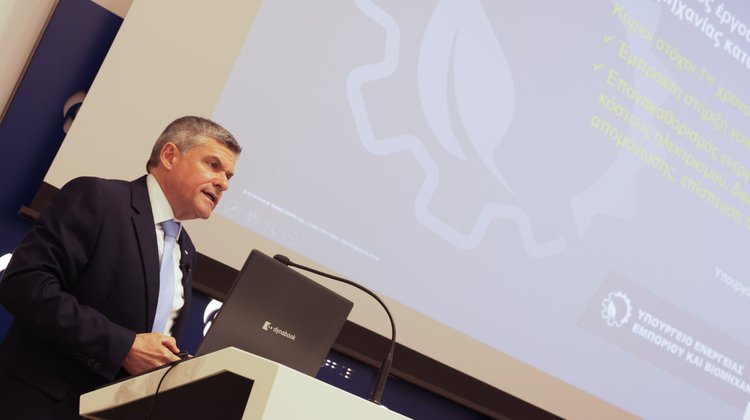Consumers should not be charged before operation of Great Sea Interconnector, Minister says
06:38 - 23 April 2024

Cypriot electricity consumers should not be burdened with a surcharge before the operation of the electricity interconnector linking Greece and Cyprus and the consequent reduction of electricity costs, Minister of Energy, Commerce and Industry George Papanastasiou has said.
Speaking during a 22 April press conference to present the Ministry’s work for the past year, Papanastasiou said the request of the project’s promoter, Greece’s Independent Power Transmission Operator (IPTO) over a surcharge to electricity bills in a bid to recover its investment on the €1.9-billion project is being examined by Cyprus’s and Greece’s Electricity Regulating Authorities, “which will decide taking into account the protection of electricity consumer as well.”
“This is a matter of principle. When there’s no cable in operation no one is justified to charge anyone over enjoying this (electricity) flow in the future,” he said.
Acknowledging the multiple benefits which the project will yield for Cyprus, with an estimated commercial operation in 2029, Papanastasiou noted however that the project is considered as high-cost whereas the influx of renewable energy in the electricity mix depends on the operation of the interconnection.
He also noted that the cost is allocated by 63% for Cyprus and by 37% for Greece, as the cable interconnection will yield more advantages to the Cypriot consumers.
With regard to the developments in the Cypriot Exclusive Economic Zone (EEZ), Papanastasiou said that ExxonMobil and Qatar Energy consortium are carrying out 3-D seismic surveys in block 5 which “offer some optimism,”, noting that in 2024 the consortium will carry out an appraisal well in Glaucus gas field in block 10 with an estimated quantity of 5 to 8 trillion cubic feet of natural gas.
The Minister also said that on the basis of the Glaucus 2, appraisal well, more potential exploratory targets have been identified in blocks 5 and 10, while potential synergies with neighbouring discoveries have been considered.
He also stated that the Ministry is encouraging energy companies operating in the Cypriot EEZ to explore synergies so that gas fields could be connected via pipelines and joint development infrastructures could develop.
With regard to “Cronos” and “Zeus” gas fields operated by the Italian ENI and the French TotalEnergies, Papanastasiou said the gas fields are of excellent quality, adding that the Ministry awaits submission of the Development Plan for “Cronos” which will be evaluated with a view to reaching an agreement this year.
Furthermore, Papanastasiou referred to the resumption of the construction works for the LNG terminal in Vasilikos, noting the infrastructure works are estimated to conclude by end-2024 or early 2025, while the floating regasification unit will be received in May or June 2024.
At the same time, the Cyprus Natural Gas Public Company will proceed with the implementation of the inland gas distribution network while actions will be taken for LNG provision contracts.
Replying to a question, the Energy Minister said that natural gas for generating electricity is expected to be introduced in mid-2025.
With regard to promotion of renewable energy, Papanastasiou recalled the operation of the 1st phase of a digital platform for licensing applications and the completion of a study aiming to streamline the procedure, as well as updating Cyprus’s Integrated National Energy and Climate Plan (NECP), expected to be submitted in June 2024.
On future actions, Papanastasiou also recalled the actions aiming to upgrade, digitalise and expanding electricity grid utilising an EU grant of €120 million and the implementation of the ten-year programme for the development of the Transmission System.
He also recalled that the scheme “Photovoltaics for Everyone,” attracted 5,100 applications so far with the scheme remaining open until all six thousand applications are submitted.
Papanastasiou pointed out that grants paid from the Renewable and Energy Conservation Fund have risen by an annual 300% in 2023 reaching €23.5 million from €5.8 million, while applications rose by 64% year over year.
(Source: CNA)

